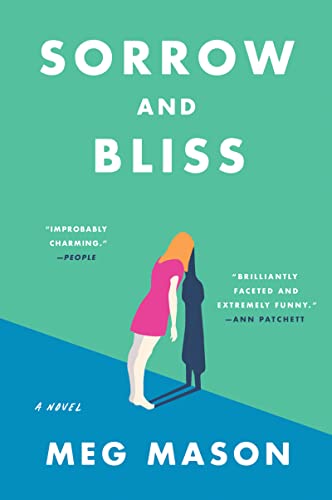Hello and welcome to our Read With Us discussion of Sorrow and Bliss by Meg Mason. I'm anxious to discuss most of the books we've chosen, but I've been especially looking forward to this one. I first read the book back in April of this year and wished I had someone to discuss it with then. I don't know of a better bunch of people for a book discussion than all of you, so my wish is finally coming true.
Carole, Kym, and I have each posted a question or two on our blogs today, and we will have an in-person Zoom discussion at 7:00 pm Eastern this evening. You can send me an email (the email address is in the upper right) to RSVP and I will make sure you get an invitation with the Zoom link if you haven't already. Please feel free to answer the questions and add your opinions in the comments, no matter whether you have read the book or not (or even if you tried and didn't finish). I'll be replying to your posts within the comment section for this discussion - and you can comment on other people's comments as well. If you are unable to attend the Zoom discussion tonight, we'd love to hear your thoughts, but you needn't feel obligated to comment here if you'll be attending the Zoom discussion. Your thoughts, comments, and opinions are valuable and we'd like to hear them here or in person tonight. I just don't want you to feel like you need to discuss the book twice (unless you want to)!
So the question that I have most wondered about and wanted to discuss is this: What did you think of the use of the — in Sorrow and Bliss? Did not naming Martha's mental illness push you to think about the use of labels regarding mental illness? Although Martha finally does receive a diagnosis, the name of her condition isn’t revealed in the text. Why do you think the author chose to present it with a dash (or X if you listened to the audiobook)? How did it impact your experience as a reader? If we have an identified illness does that excuse our behavior? Can we simply decide to change?
Martha herself says: “The thing about labels is they’re very useful when they’re right …because then you don’t give yourself wrong ones, like insane, or psychotic, or bad wife.”
Mason said that she began writing Sorrow and Bliss with a condition in mind, but quickly ditched it because she didn’t want to “…badly describe someone’s experience, or diminish it.” She went on to say how that decision linked to the fact that Martha seeks a diagnosis for many, many years and in the interim, her relationships are impacted by her mental health. “The reason I redacted it was that it didn’t matter. Plus, I wanted the reader to experience some of Martha’s frustration – it’s right there, but just out of grasp” Mason went on to say that by not naming the condition, more readers might identify with parts of Martha’s experience. I think Mason achieves this – a label leads you down a path of assumptions and generalizations. Instead, the reader shares Martha’s uncertainty.
I'll admit that immediately after I finished the book, I wondered what Martha's diagnosis was. Various reviewers and critics have postulated that it could have been bipolar disorder, borderline personality disorder, or even schizophrenia. I think that really, what Martha ‘has’ is beside the point – what is important is how she lives, and how she relates to others.
What do you think?



















































